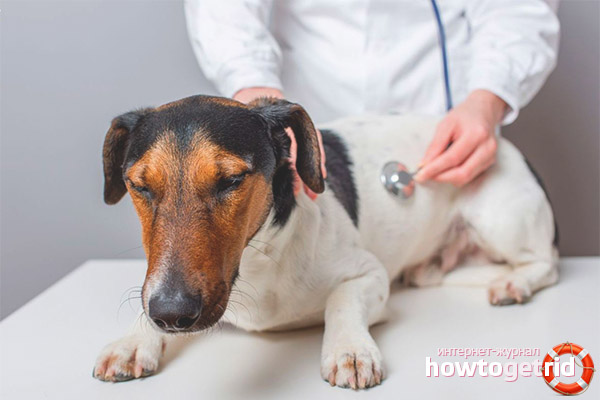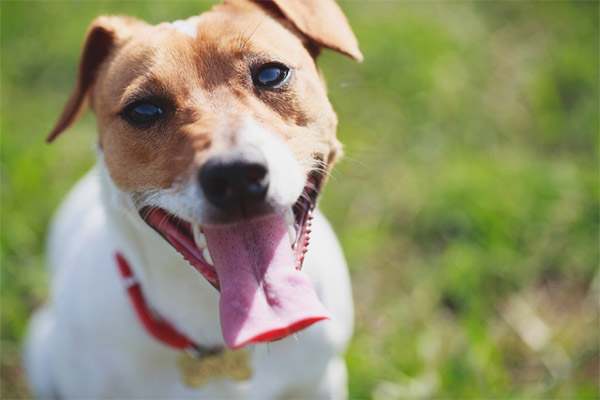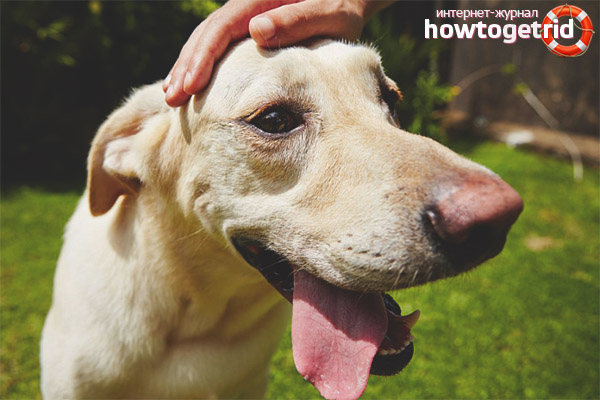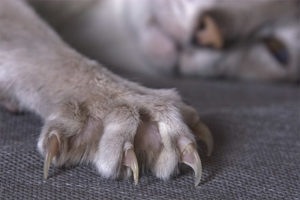The content of the article
Dogs love to frolic and play, race around the playground, happy to go with the owner for a long walk. But suddenly something strange happens. Pet begins to choke, gasping for air while driving, or when lying on its bedding.
Shortness of breath - a dangerous symptom
The scientific name for lack of air is dyspnea. If during hours of active physical exertion, after training at the site, the dog is breathing heavily - this is normal. After a short period everything will be fine. But when during a walk, after walking a few meters, the pet stops and breathes heavily - it’s time to turn to the vet.
Shortness of breath has several causes. It may arise due to:
- Hypoxia. This means that there is too little oxygen in the body. This pathology leads to irritation of the respiratory center, located in the brain.There is a feeling that there is not enough air, and breathing becomes quite involuntary. The most common cause of this is many diseases.
- Hypoxemia, when the level of oxygen in the blood falls.
- Without a proper amount of oxygen, breathing is lost by several noticeable parameters: its rhythm, depth and frequency are simultaneously disturbed.
Clinical picture
To understand that the dog does not have enough air, you should pay attention to the following signs:
- When breathing in or out, the animal has to make an effort.
- With breathing, extraneous sounds are pulled out of the chest, most often it is whistling or wheezing.
- The pet breathes only with open mouth, swallowing air with greed.
- The gums and lips become bluish or pale.
- Unusual behavior. Most often, it manifests itself in the fact that the dog begins to stretch its neck and tries to place its paws, but cannot lie down.
- The dog is in a state of excitement, and then signs of oppression appear.
What can cause shortness of breath in dogs?
The safest reasons are too active games or a long journey without rest, as well as the absence of water in the bowl.In turn, the serious reasons that the owners can not be ignored, experts divided into three categories.
Respiratory diseases
These include infectious diseases, malfunction of the internal organs and injuries. This type of pathology is caused by lung diseases, types of pleurisy, the appearance of tumors, fluid accumulated in the sternum, mechanical damage, first of all, a fracture of the chest.
If the owner asked for help from a specialist because of the occurrence of dyspnea in a pet, first of all, it is checked whether there is a foreign body in the airways.
Disturbed breathing can be caused by bronchial asthma, but then signs of suffocation also appear. Pneumonia is also accompanied by fever.
With anemia, all body tissues need oxygen, but it comes in very small quantities, which affects the respiratory system of the dog.
Cardiogenic ailments
Heart disease affects not only people. Dogs can also be observed:
- Myocardial infarction, in this case, weakness periodically appears, palpitations and shortness of breath begin, pains in the heart suddenly occur.
- Heart failure. May be of several types - chronic or acute;
heart defects. - Ischemic disease
In this category are all diseases that characterize a weak heart or impaired blood circulation. The first signs of such ailments are constant shortness of breath when walking while walking, when the dog is often forced to stop, sit or lie down due to the lack of adequate oxygen levels. Or the animal can not run, because it lacks air.
Most often, the appearance of shortness of breath provokes pulmonary edema, and it in turn arises due to a weak heart muscle.
CNS Pathologies
There are rocks that, due to natural data, are sure to have shortness of breath. They belong to brachycephalus, and all dogs with a flattened nose are exposed to brachycephalic syndrome, and the specific position of the soft palate tissues is observed. Such a special anatomical structure is observed in bulldogs, pugs, and Pekingese. Representatives of these breeds do not tolerate strong physical exertion, stressful situations, too much heat. In all these situations, their health begins to deteriorate sharply,and if time does not provide expert assistance, the pet may die.
But also this category includes such reasons as:
- hematomas;
- tumors developing in the brain part;
- head injuries;
- severe electric shock, resulting in an animal suffering a painful shock;
- stressful conditions.
In bitches after the birth of puppies, shortness of breath may also appear. Usually it disappears quickly. However, if symptoms such as bleeding, vomiting, fever, impaired coordination are added to shortness of breath, this is a bad sign. So, mom's life is in danger, and we need a veterinarian.
It should be borne in mind that obesity and pregnancy cause shortness of breath, as in these cases the mobility of the chest, as well as the lungs, is limited.
An allergic reaction can overtake the dog.In this case, shortness of breath due to the fact that edema begins, the larynx or bronchi narrows, and the air is difficult to penetrate into the lungs.
Host and vet help

If breathing is lost after suffering stress, the dog should be moved to a quiet, cool place, stroked, massaged his chest, his back and soothed. It is advisable to wipe the wool, if it was wet, soft, natural cloth. But it is not recommended to force the dog to go to bed and try to feed him, even with his favorite delicacy. It is impossible to give chilled water, otherwise there may be a threat of pneumonia, edema or collapse of the lungs.
If the dog does not wish to lie down, it is not necessary to insist, since the lungs may be too full of oxygen, and in the supine position there is a danger of rupture of the lung tissue.
But, if there are other causes of pathology, you will need fresh air. There are also drugs that are necessary for those dogs that have problems of this nature arise too often.
It:
- Medications that relieve swelling. First of all, it is suprastin. It needs to be crushed and rubbed under the tongue, the dose is half a pill for 5-8 kg of weight.
- Immunostimulants. Introduced intramuscularly in the paws. The dose is given strictly as indicated in the instructions.
- Potassium chloride. Introduced intravenously, but still it is better to entrust such an injection to a specialist.
If the dog’s condition is a concern, you will need a veterinarian. Based on the examination, he will make the correct diagnosis, identify the cause of dyspnea and develop a treatment plan.
Video: dog dyspnea












To send